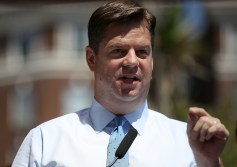Gigabit internet should be a universal utility in San Francisco, says city report

Internet should be offered as a utility in San Francisco, according to the latest report from San Francisco Supervisor Mark Farrell’s Blue Ribbon Panel on municipal broadband.
The report is the second in a series from the panel, which is charged with exploring the viability of a citywide gigabit fiber network for everyone in San Francisco. Through case studies, panelists explain in the report that “services that start off as luxuries can become utilities as their centrality to life becomes clear.” Like electricity, the panelists conclude, internet service has now become essential enough to warrant utility status.
The panel’s first report, published in June, concluded that citywide municipal fiber should be deployed to serve residents and businesses and close the digital divide.
“We should settle for nothing less than eliminating the digital divide once and for all through this project and network,” said Supervisor Mark Farrell in a statement accompanying the release of the panel’s latest report. “The status quo only serves to perpetuate inequities across San Francisco — we can and must do better.”
The report also cites the broad availability of internet in cities in Sweden, South Korea, Japan, Hong Kong and Singpore, as evidence that treating internet service as a utility — rather than adopting a demand-driven model as the U.S. free market has done — is an effective means of ensuring service is available to 100 percent of society at “a reasonable cost.”
A contract accompanied by $750 million in financial support offered by the Singaporean government was enough to eliminate the nation’s internet monopoly and ensure symmetrical gigabit service at a subscriber cost of about $30 to $40 a month, the report says, adding that “no one has been left behind.”
While internet connectivity alone can’t solve societal problems of inequity, it is a requisite to the solution, the panel writes.
“The risk is that if San Francisco were to pursue a demand approach, the city would perpetuate and amplify existing disparities in opportunity. Lack of internet access is both a cause and a consequence of unequal access to economic and social resources,” the report reads.
And while some — 34 percent — cite the expense of internet service as the reason why they don’t have a connection at home, most are limited not by their personal finances, but general availability of quality service.
For that reason, it is government’s responsibility to ensure that internet is treated as a utility and available to everyone, the report concludes, noting that the private sector has “no plans or particular incentives to connect every premise to fiber.”
Subsequent reports will continue to assist the city in its consideration of “whether and how” to build a municipal fiber network, exploring issues including potential business opportunities for the city; available financing mechanisms; and privacy, governance and security considerations.
The latest report was produced by Harvard Law Professor Susan Crawford and the panel’s subcommittee on technology and infrastructure, which is chaired by Allen Hammond, a Santa Clara University law professor.
The panel was formed in March to explore more closely the findings of a 2016 report suggesting that San Francisco government should find a private partner to make such a network a reality.
Because the network was estimated to cost $1.1 billion to build and expected to operate at a $145 million deficit, researchers recommended pursuing a partnership model that would relieve some of the city’s financial burden and further offset costs by instituting a mandatory $26 monthly fee for all homes and businesses in the city.
The city has not announced any immediate plans to make a decision on building a network, nor named possible private sector partners for such a project.






